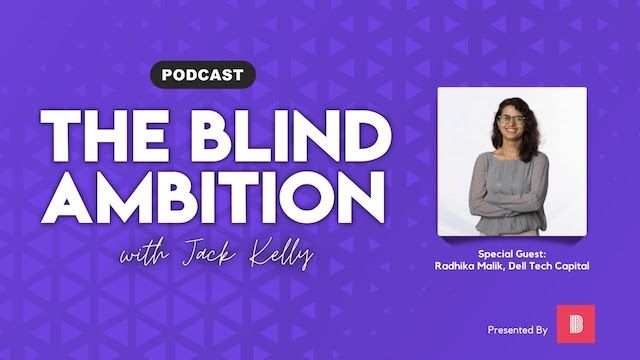Dell Technologies Capital Principal Radhika Malik Explains What Corporate Venture Capital Is Like

“The Blind Ambition with Jack Kelly” provides a candid look into the top tech companies. Go behind the scenes with tech and workplace leaders and explore engineering and work culture, what it takes to land a role at these companies, and how to build, scale and succeed as an engineer or technologist.
Radhika Malik is a venture capitalist. She is a principal at Dell Technologies Capital, which leads investments in disruptive, early-stage startups in enterprise and cloud infrastructure.
Below are some highlights of the podcast featuring Radhika. Listen to “The Blind Ambition with Jack Kelly” above or on your favorite podcast app.
How do you become a venture capitalist?
Venture capital is a fun job. Like most people in venture, I didn’t have a linear path into it. You sort of meander your way a little bit, and then you find yourself. Usually, in a VC job, there’s no straight path.
… I really like… it [as someone who is] intellectually curious. I feel like I’m always drinking from the firehose. You’re always meeting really smart people who are really building the future of technology and business, and you get to work with all of these smart, hardworking, good people… and that’s what’s really fun for me in this job.
What Radhika and Dell Technologies Capital look for in a possible investment
We are thinking about the future of the enterprise…
- How will people five, 10 years down the line… communicate?
- How will organizations do work?
- How will people collaborate?
- What are the underlying infrastructures that have to power those new experiences in people working together and collaborating in a better way?
And on the infrastructure side, everything we hear about [is] new types of data, data infrastructure… the cloud… Wi-Fi, 4G, but also 5G… and everything from the semiconductors… to all of the other layers of infrastructure that have to power the new ways for us to work and collaborate.
How a venture capitalist determines what is or isn’t hype
The number one thing that we index on with the startups we meet with is, of course, the team.
It’s the team that’s building it. You want to have people who have very strong credibility in the areas where they’re operating… We look for people who have expertise in those technologies and have… built something that’s deeply [and] technically differentiated.
And to couple with that: You don’t just want technology. You want technology that can be built into a product and [a] product that can be built into a business.
How do you know if you have what it takes to start a startup?
It’s a journey… I think you build an interesting technology. You have to have a lot of different conversations with potential users [and] potential customers to see what… people [would] use that technology for, and that’s what takes it from a technology into a product.
Now [between] product and startup, that’s really for you to figure out: Am I willing to be all-in on this? Am I willing to take the plunge? A side hustle is not a startup.
- Can I recruit the first couple of team members?
- Can I find investors who can believe in my vision and work with me [on] this journey?
… When you have that conviction that yes, I can build something of value, and then, the demand is big enough, and I have the team to execute on that demand to have this growth and [a] virile business and venture-scale business… [The] timeline… could be anywhere from a few months to years in some cases.
Entrepreneurs shouldn’t be afraid of someone stealing their idea
I think that just means it’s a huge market, and you validated the demand for this thing [your startup idea]. I think that’s a very secondary concern. I don’t think people should be worried about that [someone stealing your startup idea].
The difference between consumer and enterprise startups
When you think about the enterprise side, it’s a lot more thinking about software as a business.
- How do you identify who is your target customer?
- [How are you] building out a sales team and selling to those customers?
- [Are you] understanding the value that your product is creating for them and doing that day in and day out, repeatedly, and at scale?
[There] is definitely a different mindset than… building a consumer app where you’re trying to get [a] critical mass of users and continuing that hockey-stick growth in terms of users.
Only some startups should raise venture capital
It has to be a big market, and your product does need to be differentiated enough so that you can capture a big…. meaningful part of that large market that’s hopefully growing as well.
Now, can it be a billion-dollar business? That’s the question you want to answer.